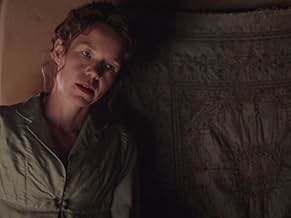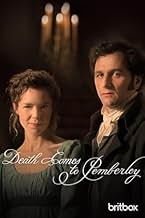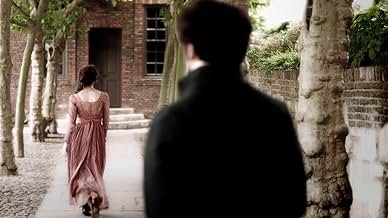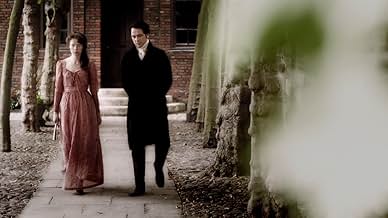Füge eine Handlung in deiner Sprache hinzuElizabeth and Darcy, now six years married, are preparing for their annual ball when festivities are brought to an abrupt halt. An adaptation of PD James's homage to Pride and Prejudice.Elizabeth and Darcy, now six years married, are preparing for their annual ball when festivities are brought to an abrupt halt. An adaptation of PD James's homage to Pride and Prejudice.Elizabeth and Darcy, now six years married, are preparing for their annual ball when festivities are brought to an abrupt halt. An adaptation of PD James's homage to Pride and Prejudice.
- Auszeichnungen
- 2 Nominierungen insgesamt
Folgen durchsuchen
Empfohlene Bewertungen
First , I do have to agree with reviewers who noted anachronisms of language and highly unlikely behaviours - Georgiana falling to her knees crying in front of male servants in the public rooms being one of the most obvious. I do not believe for a moment in the central premise that Darcy and family would be cast into Outer Darkness socially because his brother-in-law was a criminal. Gossiped about undoubtedly, but bad apples among the aristocracy are hardly uncommon now or then.
I feel also critical of the costuming and general appearance of Elizabeth , it become clear at the end as to why she might have looked tired but why she should be so badly dressed is beyond me . One coat-like garment resembles nothing so much as a hessian bag and she appears to only wear two plain dresses for weeks on end. Georgiana seems to have only one - though it is a nicer one . And Elizabeth's hair seem so be permanently dishevelled for no good reason. While I'm carping , I also have to say I don't understand why there appears to be almost no upper servants in the vast edifice of Pemberley. Such an establishment would have a steward and/or butler, several footmen and under-footmen and Mrs Reynolds would have many maids under her . Ah well, no matter really I guess.
On the plus side, I thought all the acting was great , especially the female cast. Lydia was beautifully cast and played, as was Lady Catherine and Mrs Bennett . I wish they could have had bigger roles in fact . So, in spite of the above mentioned criticisms, I have to say it was a very watchable period drama and , actually, much more fun than the the book . I like PD James very much , but this was NOT her best work and frankly rather a tedious dry read .
I feel also critical of the costuming and general appearance of Elizabeth , it become clear at the end as to why she might have looked tired but why she should be so badly dressed is beyond me . One coat-like garment resembles nothing so much as a hessian bag and she appears to only wear two plain dresses for weeks on end. Georgiana seems to have only one - though it is a nicer one . And Elizabeth's hair seem so be permanently dishevelled for no good reason. While I'm carping , I also have to say I don't understand why there appears to be almost no upper servants in the vast edifice of Pemberley. Such an establishment would have a steward and/or butler, several footmen and under-footmen and Mrs Reynolds would have many maids under her . Ah well, no matter really I guess.
On the plus side, I thought all the acting was great , especially the female cast. Lydia was beautifully cast and played, as was Lady Catherine and Mrs Bennett . I wish they could have had bigger roles in fact . So, in spite of the above mentioned criticisms, I have to say it was a very watchable period drama and , actually, much more fun than the the book . I like PD James very much , but this was NOT her best work and frankly rather a tedious dry read .
Daniel Peacock's adaptation of P. D. James' reworking of PRIDE AND PREJUDICE offers a fascinating combination of styles and stylistics. It unfolds in the leisurely manner of most British television detective thrillers, taking care to sketch in the characters and define their relationship to one another. A murder occurs two-thirds of the way through the first episode, and the remainder of the time is spent outlining the series of hypotheses, assumptions (some mistaken), and clues that lead to the unmaking of the culprit. DEATH COMES TO PEMBERLEY also situates itself squarely in the heritage adaptation genre, with plenty of exterior shots of the Darcys' house (I counted twelve in episode one alone), augmented with moments of period 'realism' as various types of coach and horse arrive and depart from the front entrance. The cast comprises a series of star names calculated to appeal to different generations of television viewers; Jenna Coleman from EMMERDALE and DOCTOR WHO shares the screen with Trevor Eve (WAKING THE DEAD, SHOESTRING) and Penelope Keith (THE GOOD LIFE, TO THE MANOR BORN). The acting is competent without being out of the ordinary, although I do wonder whether the Lydia Bennet of Austen and James would have reacted with quite such ferocity to her husband's arrest. What gives this production is true fascination, however, is the way in which director Peacock deliberately references Simon Langton's PRIDE AND PREJUDICE (1995) throughout the mise-en-scene. This can be seen in the costume- designs (by Marianne Agertoft), as well as in the characterization: Elizabeth Bennet (Anna Maxwell Martin) communicates the same spirit of quiet determination embodied by Jennifer Ehle in the earlier production. She is also shot in much the same way, with the emphasis placed on her reactions to what happens around her. Her mother (Rebecca Front) seems completely oblivious to her offspring's feelings and shrilly complains of having had a fit should anything go wrong, in a performance inspired by Alison Steadman's reading in the earlier revival. Likewise her husband; James Fleet follows Benjamin Whitrow in maintaining a facade of polite loyalty to Mrs. Bennet, while searching for any opportunity to escape. The experience of watching DEATH COMES TO PEMBERLEY is a fascinating one, an exercise in identifying intertexts as well as understanding how adaptations are shaped as much by other adaptations as by their source-texts. Definitely worth watching.
Firstly, I hate fanfic. My teeth start grinding after a few paragraphs, even when it's written by PD James.
Secondly, if you're going to do anything with P&P you have to judge your two main casting decisions with a perfection required almost nowhere else. We all know Elizabeth and Darcy so well. So the producers of two productions which have dared to go off piste, Lost in Austen and this one, must have thought long and hard. Gemma Arterton did extremely well in Lost in Austen, a blend of period drama, summer RomCom and Dr Who, and Anna Maxwell Martin, as you might expect, is simply perfect here, in Austen meets the Poirot Christmas Special.
Anna gives us the mature Elizabeth, holding court at her more informal Pemberley, with an older Darcy who has recovered all his manly confidence in personal relationships and yet is even more deeply smitten. They have a son and are clearly wonderful parents. Both characters have changed in exactly the way Austen predicted in her last chapter. Elizabeth has risen in status and now wears the authority of Mistress of Pemberley, rationally softened, like its master. They are unusually sparkly together and very reminiscent of the Netherfield scenes. This is principally down to the extremely good performances from two actors and an their understanding of their characters which goes way beyond the script.
The whole cast is outstanding, the best in a period drama since Emma09 and the mystery is satisfyingly interesting. There's lots of clever 'dialogue' with the original and arch references to earlier productions (it's the 95 Pemberley).
What's not to like?
Can't wait for the next instalment, as Pemberley itself is challenged and their relationship is tested. I do hope the Bingleys, Caroline at least, turn up soon.
Of course, it isn't Austen. If it hurts to think that it is, then imagine it as a 100-year prequel to Downton Abbey, 10 times better acted and 50 times better written.
Secondly, if you're going to do anything with P&P you have to judge your two main casting decisions with a perfection required almost nowhere else. We all know Elizabeth and Darcy so well. So the producers of two productions which have dared to go off piste, Lost in Austen and this one, must have thought long and hard. Gemma Arterton did extremely well in Lost in Austen, a blend of period drama, summer RomCom and Dr Who, and Anna Maxwell Martin, as you might expect, is simply perfect here, in Austen meets the Poirot Christmas Special.
Anna gives us the mature Elizabeth, holding court at her more informal Pemberley, with an older Darcy who has recovered all his manly confidence in personal relationships and yet is even more deeply smitten. They have a son and are clearly wonderful parents. Both characters have changed in exactly the way Austen predicted in her last chapter. Elizabeth has risen in status and now wears the authority of Mistress of Pemberley, rationally softened, like its master. They are unusually sparkly together and very reminiscent of the Netherfield scenes. This is principally down to the extremely good performances from two actors and an their understanding of their characters which goes way beyond the script.
The whole cast is outstanding, the best in a period drama since Emma09 and the mystery is satisfyingly interesting. There's lots of clever 'dialogue' with the original and arch references to earlier productions (it's the 95 Pemberley).
What's not to like?
Can't wait for the next instalment, as Pemberley itself is challenged and their relationship is tested. I do hope the Bingleys, Caroline at least, turn up soon.
Of course, it isn't Austen. If it hurts to think that it is, then imagine it as a 100-year prequel to Downton Abbey, 10 times better acted and 50 times better written.
I am sorry to disagree with the many fans of this. The dialogue is terribly anachronistic and a million miles from the style of Jane Austen. "Let's not overreact" from Darcy, for example, and worst of all from Lady Catherine de Bourgh, the world's most supercilious and conservative woman of her age, who says to Lizzie, "We need to talk". Need I say more?
I'm not an expert on legal procedures through the ages, but I strongly suspect that the court scenes were anachronistic, too. Others can probably give better information on this.
Also, I noticed very little chemistry between the Darcys, despite what some have claimed.
I'm not an expert on legal procedures through the ages, but I strongly suspect that the court scenes were anachronistic, too. Others can probably give better information on this.
Also, I noticed very little chemistry between the Darcys, despite what some have claimed.
So many bad reviews that I'm surprised I watched it at all. I agree it was lacking in the costume department. Elizabeth seemed to wear the same dress or nearly the same one daily. A woman of her means should have better clothing. It also lacked in staff housing. No footman, not butler, not lady's maid. They're should have been a chef and a maid for the chef. All those maids in the kitchen should have been busy I'm the house. It wasn't true to the time.
That aside I rather enjoyed it. I'm a sucker for period pieces. I loved seeing it all play out. I wanted more when it was all said and done.
Wusstest du schon
- WissenswertesChatsworth House, the Derbyshire estate where the Pemberley exteriors were filmed for this mini-series, was also filmed for Pemberley's exteriors in the 2005 film version of "Pride and Prejudice," starring Keira Knightley.
- VerbindungenFeatured in MsMojo: Top 10 Best Jane Austen-Inspired Movies (2022)
Top-Auswahl
Melde dich zum Bewerten an und greife auf die Watchlist für personalisierte Empfehlungen zu.
Details
- Erscheinungsdatum
- Herkunftsland
- Sprache
- Auch bekannt als
- Murder at Pemberley
- Drehorte
- Castle Howard, York, North Yorkshire, England, Vereinigtes Königreich(Pemberley - ballroom and other interiors)
- Produktionsfirmen
- Weitere beteiligte Unternehmen bei IMDbPro anzeigen
Zu dieser Seite beitragen
Bearbeitung vorschlagen oder fehlenden Inhalt hinzufügen





































